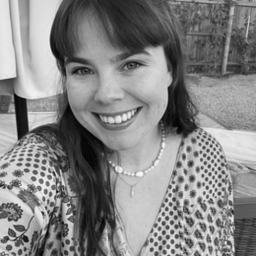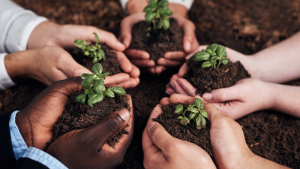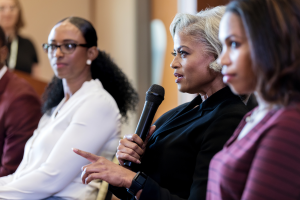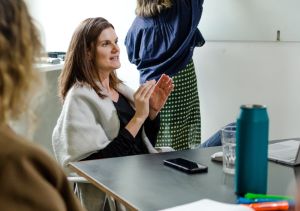
March 2025 Pick

Wendy’s Pick: The Design of Everyday Things by Don Norman
I think this is a classic read if you’re in the design industry. Originally published in 1988 (and updated since), the book explores how everyday objects like doors, light switches, and stoves often frustrate us — not because we’re using them wrong, but because they’re poorly designed. Norman argues that good design should put people first; it’s about reducing friction, guiding users naturally, and making things feel effortless. The updated edition brings in more modern examples, but the core message is timeless. It’s the kind of book that changes how you see the world and inspires you to approach your work with more intention and empathy.
February 2025 Pick

Hilary’s Pick: Saving Time by Jenny Odell
It turns out, time isn’t objective. In Saving Time, Jenny Odell offers multiple dimensions from which to see time, and the limitations of chronos (or “clock”) time – the rigid, clock-driven structure that dominates most workplaces. “Clock time assumes that time is always scarce, and that our job is to make the most of every minute, even at the cost of what matters most,” she writes.
Odell presents a compelling case for rethinking how we structure time at work. By recognizing that people experience and relate to time differently – drawing from diverse cultural backgrounds and individual needs – she challenges us to consider a more flexible, collaborative approach. This shift, which she terms “event time”, allows workers to manage their time based on personal rhythms, creating space for their unique strengths to shine.
If you’re committed to building more inclusive, equitable workplaces, this book offers mind-expanding insights on how to move from rigid, surveillance-based timekeeping to a more trust-based, autonomous approach that better supports diverse workers while improving productivity and increasing the capacity for innovation.
January 2025 Pick

Amy’s Pick: The Fourth Industrial Revolution by Klaus Schwab
I absolutely loved The Fourth Industrial Revolution. As someone just starting my career in tech, I found Schwab’s ability to simplify complex concepts into bite-sized pieces very refreshing and accessible. I also appreciated the book’s emphasis on using technology for positive social and environmental change, which encourages hope for our future.
December 2024 Picks

Prachi’s Picks: Emergent Strategy: Shaping Change, Changing Worlds by adrienne maree brown and Rehumanizing the Workplace by Rosie Ward and Jon Robison
Emergent Strategy: Shaping Change, Changing Worlds:
What if change felt natural, like birds flocking or plants growing? Emergent Strategy is a playful yet profound guide for transforming our world and businesses through small, intentional actions inspired by nature and community.
This book isn’t just a call to action; it’s a gentle, empowering guide. Brown invites us to see change not as an overwhelming force but as an opportunity to co-create something meaningful. Using examples from social justice movements, ecology, and her own life, she shows how small, adaptive shifts—like murmuration in birds—can lead to transformative outcomes.
With wisdom from social movements and science fiction, Adrienne Maree Brown shows how we can create meaningful, adaptive change—together. Perfect for dreamers and doers alike!
What if your workplace was a space where people want to show up—not just clock in? This book is your guide to transforming rigid, impersonal work environments into thriving, human-centered communities. Packed with fresh ideas and real-life examples, it shows how trust, kindness, and collaboration can unlock both employee happiness and business success.
Ready to rethink what work can be? Let’s rehumanize!
November 2024 Pick

Ashley’s Pick: Cradle to Cradle: Remaking the Way We Make Things by William McDonough and Michael Braungart
A must-read classic in the discourse of regenerative business practices, Cradle to Cradle shares an innovative approach of applying biomimicry to product design, with the entire lifecycle in mind. McDonough and Braungart advocate for creating products that either biodegrade naturally or can be fully recycled, taking inspiration from nature where waste is nonexistent. The ‘cradle to cradle’ system is practical, with real solutions offered to complex environmental challenges.
October 2024 Pick

Tania’s Pick: Decolonizing Finance by Taj James Full Spectrum Capital Partners at Decolonizing Economics Summit 2023
Quick disclaimer: While this is not technically a book recommendation, it is a learning resource that emerged as essential for leaders to view, process, understand deeply, and take action upon.
Regenerative business design is not about extraction of value, but rather adding value back to the source. Viewed through the lens of supremacy culture, in a workshop on Decolonizing Finance, Taj James addresses how we participate in both oppression and being oppressed through wealth. Have a listen to this fantastic video. It will provide a deeper insight on the history of supremacy culture and how it has created the systems that promote wealth extraction from our collective systems.
By holding onto resources, we prevent them from returning to natural systems, making those systems work harder. If we recognize that all beings are part of the same system, we would make financial decisions that allow resources to flow back into ecosystems, which are naturally regenerative.
The key is moving from survival tactics (everyone for themselves) to thriving tactics (community first). While survival techniques are sometimes necessary, we must be aware when they reinforce a system that hinders true community abundance.
September 2024 Pick

Hilary’s Pick: My Grandmother’s Hands: Racialized Trauma and the Mending of Our Bodies and Hearts by Resmaa Menakem
A few years ago, I joined an anti-racist affinity group through the Social Venture Institute (SVI) community to unpack what it means to be an anti-racist in business. Our monthly discussions led us to this groundbreaking book. Through personal stories, historical context, and body-centered practices, Menakem guides readers on a healing journey of “somatic abolitionism”, offering strategies to get present with our bodies in order to release generational trauma and liberate ourselves from the influence of White body supremacy.
This work is slow and uncomfortable – and ongoing. But I feel well-resourced by the practices and insights I learned from this book. I highly recommend joining up with others to read, digest and practice My Grandmother’s Hands in community, for that is where we truly heal.
August 2024 Pick

Renee’s Pick: Rest Is Resistance: A Manifesto by Tricia Hersey.
The title caught my eye. As someone who was recently diagnosed with ADHD, one of the symptoms I’ve struggled with for a long time is workaholism. For those born and raised in a colonial society, we’ve been shaped by colonialist/supremacist/capitalist systems. Just like a fish doesn’t necessarily recognize that it’s swimming in water, I don’t think we realize how much we are swimming in these systems that interrelate and support one another – often to the detriment of some and the benefit of others. As our society encourages, and often supports workaholism, I’ve benefited from participating in workaholism, while also losing in the process when it comes to my health (true wealth!).
This book was a bell…
A reminder to come back to being.
A reminder to engage in rest as a necessary component of not just my wellbeing but also my activism.
Only through the activity of trying to rest do we realize that many of our systems and institutions, by design, encourage and sometimes force us to do the opposite. This book is a must-read!
July 2024 Pick

Saj’s Pick: Braiding Sweetgrass by Robin Wall Kimmerer.
Written by Robin Wall Kimmerer, Potawatomi botanist, author, and educator, this book is a mix of science, spirit and story, and the message is rooted in normalizing Indigenous sustainability practices. It brings with it a really good reminder that a shift toward a more heart-centered relationship with nature is all we really need to make a huge leap in the right direction.
Likening our relationship with the Earth to that of a romantic partner, Robin offers thought-provoking examples that put a fine point on the current dysfunction of that relationship.
Imagine how selfish and unsustainable it’d be if one person in a marriage was all take, take, take, and put themselves first all the time.
Many folks start and end their sustainability journey with easily accessible acts like recycling. While recycling is certainly good, Robin brings the comparison of a partner expecting praise for only remembering your birthday and expecting a pat on the back.
Ultimately, the idea is that being kind to Mother Earth should be a willing act that’s rooted in reciprocity and mutual benefit. Not something to be done because it’s mandated by laws, or only for the sake of avoiding a complete climate disaster!
Bonus fun fact: Sweetgrass is used as a sacred plant in Indigenous traditions and ceremonies. In Robin’s Potawatomi Anishinaabe culture, sweetgrass is believed to be the hair of Mother Earth, and when braided, it’s done in 3 parts which represent the mind, body and soul. Also, sweetgrass smells really sweet when you burn it!
Lean into your growth edge
Edgerunners operate at the forefront of change and innovation, nurturing ecosystems that regenerate in collaboration with the people and forces around them.
Get Edgerunners delivered to your inbox bi-weekly.
Also on our blog












